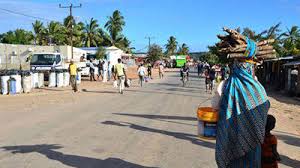
The threat to Mozambique isn’t just about gas. It isn’t just about money or security or power or territorial integrity. The conflict in Cabo Delgado is wrecking people’s lives on a vast scale. More than 700,000 people have already fled their homes in northern Mozambique and the count is still rising.
According to the United Nations’ refugee agency, UNHCR, the number could top a million by the middle of the year if the international community does not take steps to end the conflict.
Thanks to the support and encouragement from President Filipe Nyusi, his government and the governor of Cabo Delgado. I went to Cabo Delgado. The president and Mozambican officials ensured my delegation had complete and unfettered access to the region.
Even during the attacks, I still had a team in Cabo Delgado. I have seen this suffering first-hand. I paid a visit to a refugee camp in the region. I talked to people who have been hurt, who have seen their family members slaughtered by Haul Sunnah Wa-Jamo (ASWJ) fighters. I met children, some of them as young as eight or nine years old, who have been assaulted by terrorists.
And these traumatised souls are living in makeshift, flimsy facilities that are basically made of leaves!
I am heartbroken and outraged. I would like to say I’m hopeful that things will change soon, but the UNHCR’s forecast of an increase in the number of refugees over the next few months gives me pause. (It’s also sobering to hear that the UNHCR has only been able to raise five per cent of the $254 million in funding that it sought for its work in Mozambique last November.)
I’m not trying to give the impression that nothing is being done for Cabo Delgado and its people. That would not be fair or accurate.
With respect to security, Maputo has pledged to work with Total to establish a safe zone around the gas complex on the Afungi Peninsula. It will have to step up its efforts on this front, given that the attack on Palma occurred inside the perimeter of the designated zone, but it is seeking help.
Also, earlier this month, Mozambique’s government invited US military advisors and special forces into the country to deliver counter-terrorism training. It has also accepted an offer from Portugal, its former colonial ruler, to provide additional training for the Mozambican armed forces.
Even though Mozambique’s government is committed to doing everything it can to bring real peace and stability to Cabo Delgado, it needs more support than it is currently getting. It will need ongoing support from the international community – not just in response to the most recent attacks, but for the long haul.
If it doesn’t get that, ASWJ will continue to wreak havoc and force people out of their homes, making terrorism the biggest cause of poverty in Mozambique. If there isn’t enough help – and if large-scale projects like Mozambique LNG no longer are an option to create jobs and grow the economy – the country will sink further into despair. Cabo Delgado’s people will feel even more marginalised.
The country’s natural environment will continue to suffer damage, and there will be no one available to help. There has been talk about negotiations and giving amnesty to ASWJ members who give up the fight. And as I’ve already mentioned, there are plans to provide training and advisory services to Mozambique’s armed forces.
But we have to do more, and we have to do better – not just the international community, but all of us, as individuals and business leaders.
We can start by denouncing the evil that we’re seeing in Mozambique. We must condemn the assaults and the crimes that are being committed by the terrorists who seek to gain control of Cabo Delgado. We can’t just remain quiet, as if nothing consequential is happening there. We must give President Nyusi the necessary support and backing to fix this.
Right now, more than ever, the country needs our support and our voices and our involvement. “Leaving behind nights of terror and fear, I rise. Into a daybreak that’s wondrously clear, I rise”. Concluded Maya Angelou. Energy workers, Palma, Cabo Delgado and Mozambique will rise out of this like the African sun rises every day.
- A Tell opinion/NJ Ayuk, executive chairman, African Energy Chamber











